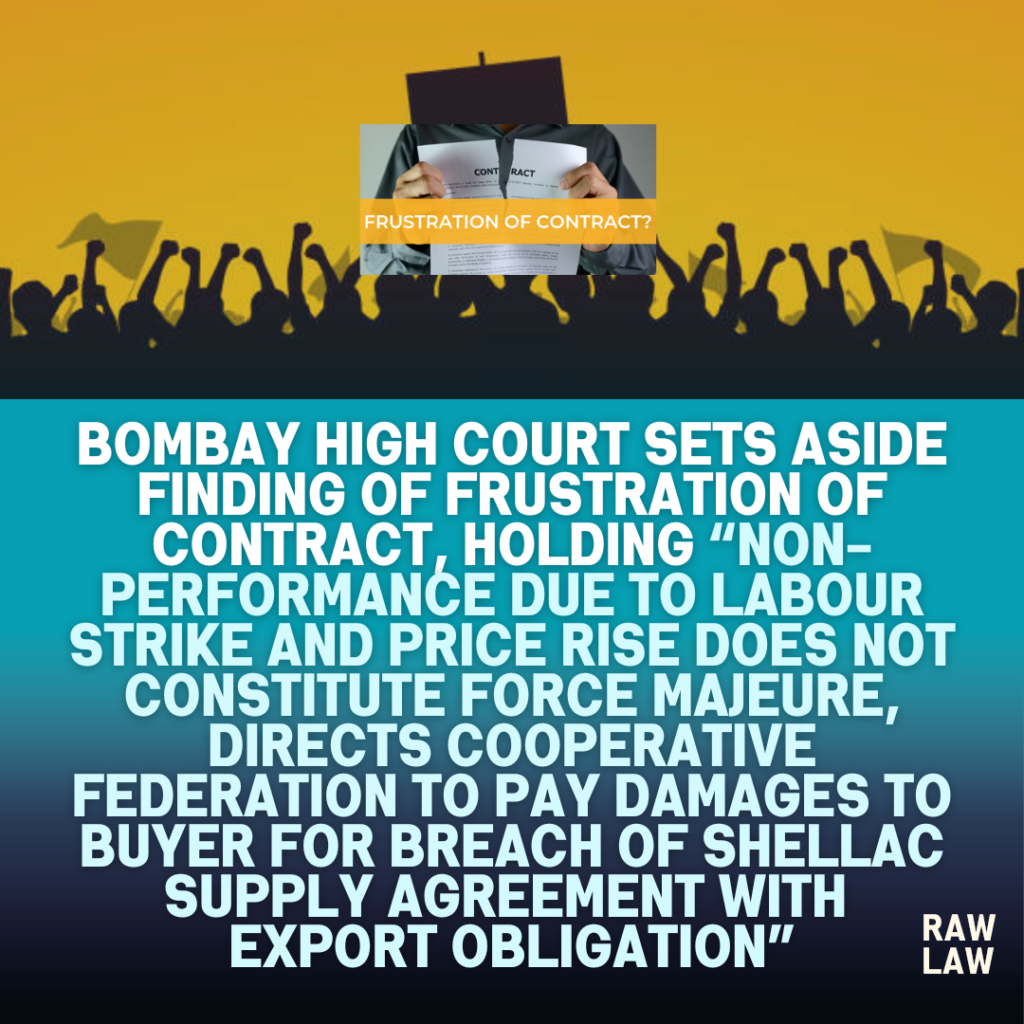Court’s Decision
The Bombay High Court allowed the appeal, reversing the Single Judge’s finding that the contract was frustrated under Section 56 of the Contract Act due to labour strike and machinery breakdown. It held that the cooperative federation could not avoid performance on grounds of force majeure when it entered the contract with prior knowledge of boiler issues. The Court directed the federation to pay damages of Rs. 14,23,920 to the appellant for non-delivery of 24MT of T.N. Shellac, calculated based on market price difference, with interest, recognizing the export obligations linked to the transaction.
Facts
The appellant, an exporter of shellac, entered into a contract on 15 April 2000 with the respondent cooperative federation for the purchase of 24MT T.N. Shellac for export to Egyptian buyers. The appellant paid 10% earnest money, which was acknowledged, and requested delivery by 20 May 2000. The federation later terminated the contract on 26 July 2000 citing labour strikes and boiler chimney issues, returning the earnest money. The appellant had to procure shellac at a higher market rate to meet export obligations, incurring losses of Rs. 14,23,920, leading to a suit for damages.
Issues
- Whether the contract was frustrated under Section 56 of the Contract Act due to alleged force majeure conditions (labour strikes and boiler damage).
- Whether the non-supply of shellac constituted a breach entitling the appellant to damages.
- Whether the appellant could claim damages based on market price difference under Section 73 of the Contract Act and Section 57 of the Sale of Goods Act.
Petitioner’s Arguments
The appellant argued that the contract was concluded with clear terms and earnest money paid, and the federation’s claim of force majeure due to chimney damage was an afterthought. It argued that the federation was aware of the boiler issues at the time of contracting but did not inform the appellant and could not later use it to avoid performance. It submitted that the federation’s reliance on price rise and labour issues was insufficient to constitute frustration and claimed damages for the market price difference, relying on the Shellac Export Promotion Council market rates as a standard.
Respondent’s Arguments
The federation contended there was no concluded contract due to pending clarifications on quality and delivery schedule, and that the earnest money was only a provisional deposit. It argued that boiler damage and a labour strike constituted a supervening impossibility under Section 56, leading to frustration of the contract. It also argued the appellant failed to prove actual loss linked to the alleged breach and that the claim for damages based on loss of profits from export was remote and not within the parties’ contemplation under Section 73.
Analysis of the Law
The Court analysed Sections 56 and 73 of the Contract Act and Section 57 of the Sale of Goods Act, emphasizing that force majeure under Indian law requires impossibility of performance, not merely hardship, price rise, or inconvenience. The Court noted that the federation’s reliance on frustration failed as it had prior knowledge of the boiler issues and could have contemplated the risks. Citing Energy Watchdog v. CERC, the Court clarified that price escalation and strikes are not sufficient grounds unless performance becomes radically different.
Precedent Analysis
The Court relied on:
- Satyabrata Ghose v. Mugneeram Bangur: Mere inconvenience or commercial hardship does not amount to frustration.
- Energy Watchdog v. CERC: Price rise alone is insufficient for frustration.
- Murlidhar Chiranjilal v. Harishchandra Dwarkadas: Damages for non-delivery can be calculated using market price differentials, even if the buyer did not make actual purchases at the higher price.
- Dhanrajamal Gobindram v. Shamji Kalidas: Breakdown of machinery can constitute force majeure only if unforeseen and notified.
- Karsandas Thacker: The seller’s prior knowledge of the buyer’s export purpose affects damages computation under Section 73.
Court’s Reasoning
The Court held the parties had a concluded contract with acknowledged earnest money, clear pricing, and delivery timelines. The federation’s invocation of force majeure was rejected as it had prior knowledge of the chimney issues and failed to notify the appellant, which negated any unforeseen impossibility. The labour strike and price escalation were not sufficient grounds for frustration. The Court found the non-supply constituted a breach, entitling the appellant to damages calculated based on market price difference under Section 73, considering the buyer’s export commitments known to the federation.
Conclusion
The Bombay High Court set aside the Single Judge’s dismissal of the suit, holding that the federation breached the contract and was liable to pay Rs. 14,23,920 in damages to the appellant, with interest from May 2000 until realization, for the non-supply of shellac.
Implications
- Reaffirms that commercial hardship and price rise do not constitute frustration under Indian contract law.
- Clarifies that buyers can recover market price differential damages for non-delivery under Section 73.
- Establishes that force majeure claims require proof of unforeseeable impossibility, not pre-existing issues known to the party.
Referred Cases and Their Relevance
- Satyabrata Ghose: Hardship does not equal frustration.
- Energy Watchdog: Price rise insufficient for frustration.
- Murlidhar Chiranjilal: Market price difference can determine damages.
- Dhanrajamal Gobindram: Machinery breakdown only counts if unforeseen.
- Karsandas Thacker: Export-related damages require seller’s prior knowledge.
FAQs
Q1: Does a price rise or labour strike justify non-performance under force majeure?
No, the Bombay High Court ruled these are insufficient for frustration unless performance becomes impossible and the events were unforeseeable.
Q2: Can damages be claimed for market price differences without actual repurchase?
Yes, damages can be awarded using market price differentials even if the buyer did not make actual purchases at higher prices.
Q3: Is prior knowledge of supply issues relevant in force majeure claims?
Yes, prior knowledge negates unforeseeability, preventing parties from using force majeure to escape contractual obligations.



